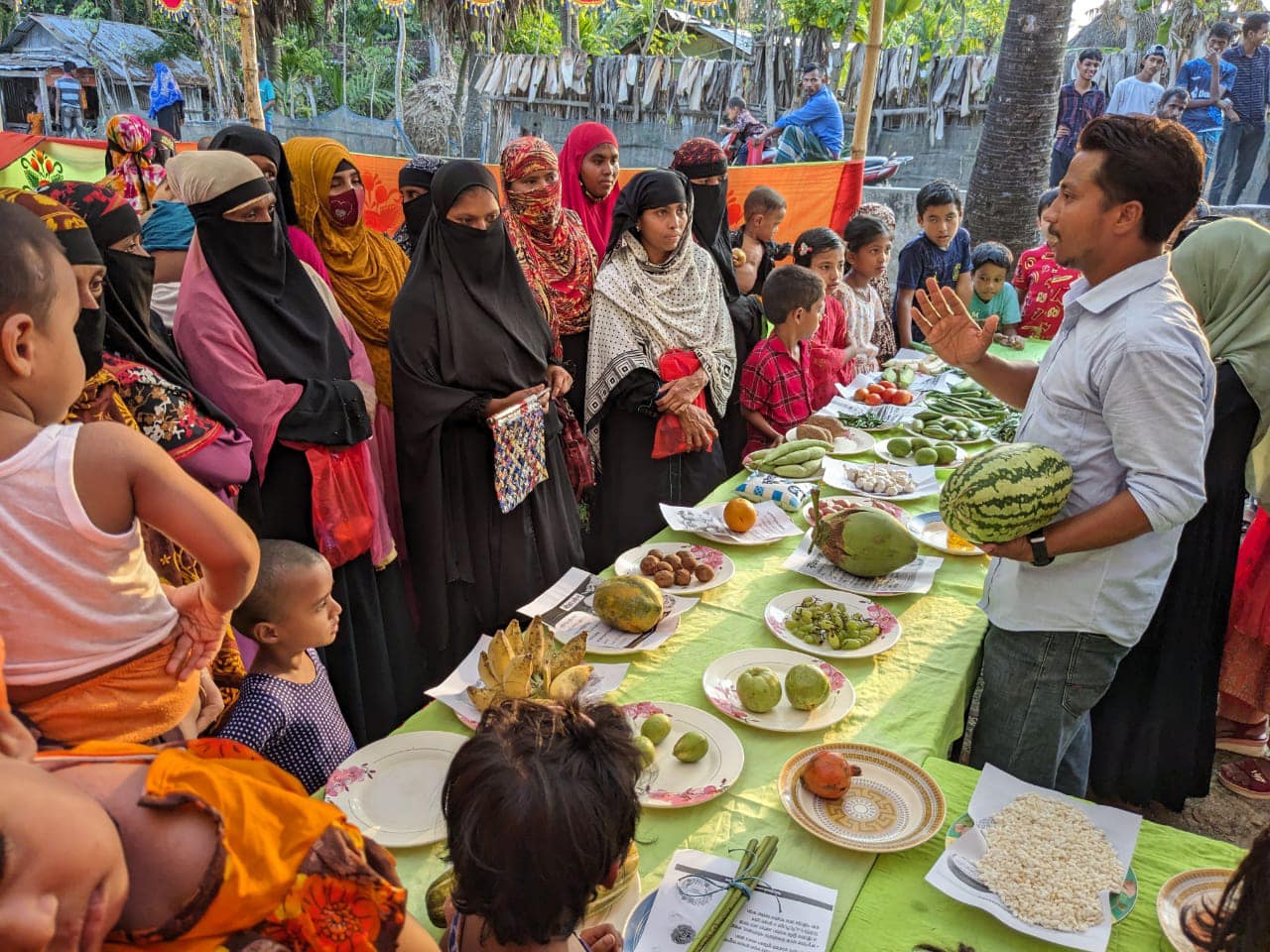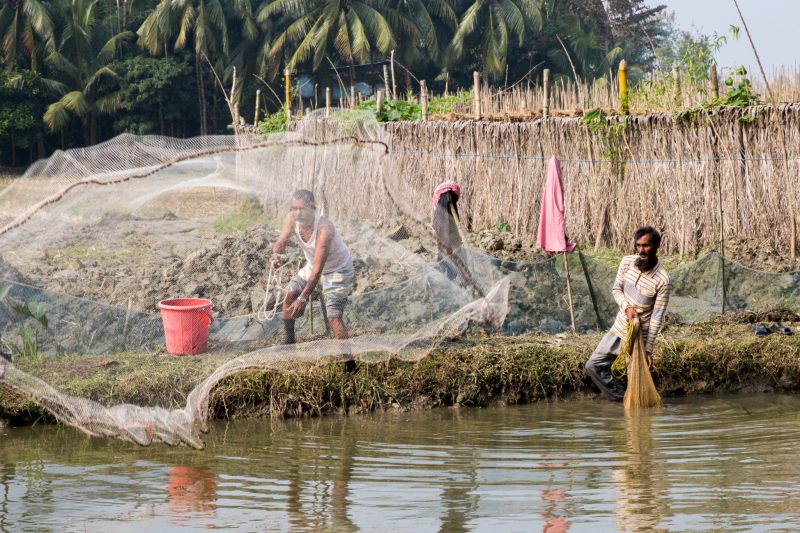
Foster sustainable agricultural practices and resilient livelihoods by promoting diversified crop cultivation and innovative aquaculture technologies, thereby empowering farmers and enhancing food security in rural communities.
Integrated Agricultural Unit (IAU)
The Agriculture Unit focuses on expanding high-value, nutrient-enriched crop varieties like aromatic and zinc-fortified rice, along with summer crops such as watermelon, tomato, capsicum, and squash. Demonstrations of 32 environmentally friendly agricultural technologies have been conducted, with over 30,000 demonstrations established by June 2022. Additionally, field days, exchange visits, and distribution of farming essentials like USG applicators, pheromone lures, and fruit bags have enhanced knowledge dissemination.
The ‘Alternative Crop Production and Generating Multiple IGAs Instead of Tobacco’ program supports former tobacco growers in cultivating alternative food crops and engaging in livestock rearing for additional income, resulting in the abandonment of tobacco cultivation on over 1,400 hectares of land.
In fisheries, various aquaculture technologies are promoted, including fish polyculture, crab fattening, and ornamental fish culture. Technical services and market linkages are provided to members, with nearly 21,000 fish farming demonstrations conducted and fish fries released to boost natural fish production. Cluster development initiatives focus on various polyculture systems, carp fattening, and nursery pond rearing, supporting sustainable fish farming practices.
Through these initiatives, the project aims to enhance agricultural productivity, promote alternative livelihoods, and foster sustainable fisheries practices, ultimately contributing to food security and economic empowerment in the target districts.
Resilient Homestead and Livelihood Support to the Vulnerable Coastal People of Bangladesh Project
Project Description:
The Resilient Housing and Livelihoods (RHL) project, implemented by CODEC with support from PKSF, aims to build a climate-adaptive coastal community in Bangladesh. It focuses on developing climate-resilient housing and livelihood solutions to mitigate the adverse impacts of climate change on vulnerable coastal populations in areas like Patuakhali, Barguna, Patharghata, and Rangabali.
The project’s key components include:
- Climate-Resilient Housing: Construction of flood and storm surge-resistant housing, elevated homesteads, climate-adaptive sanitary facilities, and rainwater harvesting systems.
- Livelihood Resilience: Promoting adaptive livelihoods such as goat and sheep rearing in slatted houses, saline-resilient agriculture, mangrove plantations, and crab farming.
- Community and Institutional Capacity Building: Enhancing the capacity of local institutions, NGOs, and community groups to plan and implement climate adaptation strategies effectively.
Through capacity building, resource access, and stakeholder collaboration, the project aims to empower communities, particularly women, to combat climate risks while fostering sustainable development in the coastal regions.
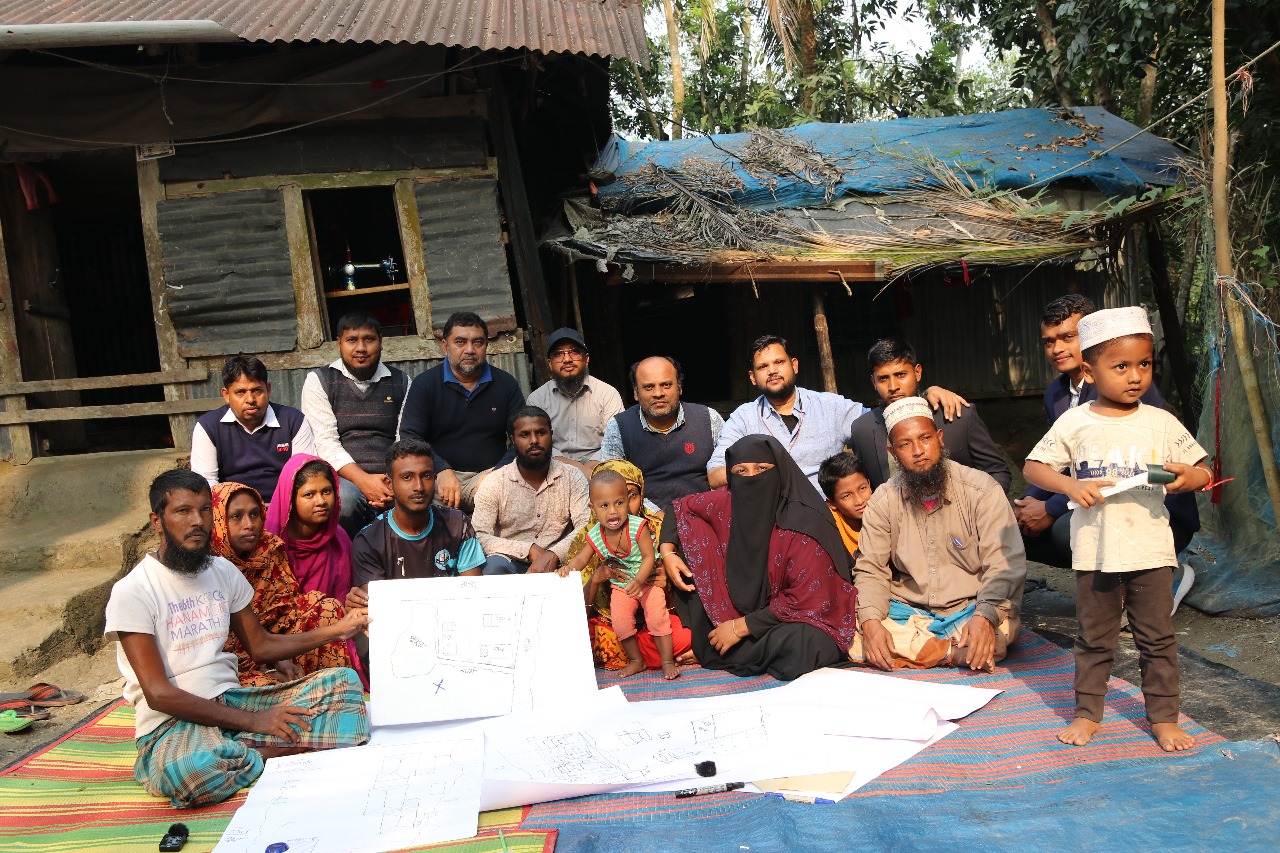
Ensuring human dignity and freedom by gradually reducing poverty in a sustainable manner, towards total elimination of poverty and beyond poverty in a sustainable development at the household level.
Enhancing Resources and Increasing Capacities of Poor Households towards Elimination of their Poverty (ENRICH)
Launched in July 2014, the ENRICH project targets Nalchity Upazila in Jhalokathi district and Chitalmari Upazila in Bagerhat district of Bangladesh. Funded by the CSR fund of PKSF and CODEC, the project aims to empower impoverished households by enhancing their resources and capabilities, ultimately leading to the elimination of poverty in the targeted areas.
The ENRICH project adopts a holistic approach to poverty alleviation, focusing on various dimensions of development, including livelihood enhancement, social empowerment, and community capacity building. Through a combination of interventions, the project aims to address the root causes of poverty and empower vulnerable households to improve their socio-economic status.
Key components of the ENRICH project include livelihood support programs, skill development training, access to microfinance services, and social mobilization activities. By providing targeted support and resources, the project seeks to enable poor households to diversify their income sources, build sustainable livelihoods, and reduce their reliance on vulnerable and precarious occupations.
Moreover, the ENRICH project emphasizes community participation and ownership, encouraging active involvement of local stakeholders in decision-making processes and project implementation. Through community-based organizations and participatory approaches, the project aims to foster social cohesion, collective action, and inclusive development.
Additionally, the ENRICH project prioritizes gender equality and social inclusion, recognizing the unique needs and challenges faced by women, youth, and marginalized groups. By promoting women’s empowerment, youth engagement, and social inclusion initiatives, the project seeks to create an enabling environment for all community members to participate in and benefit from development activities.
Overall, the ENRICH project represents a comprehensive and integrated approach to poverty reduction, aiming to build the resilience and capacity of poor households while fostering sustainable development at the community level. Through targeted interventions and partnerships with local stakeholders, the project endeavors to create lasting and meaningful improvements in the lives of vulnerable populations.
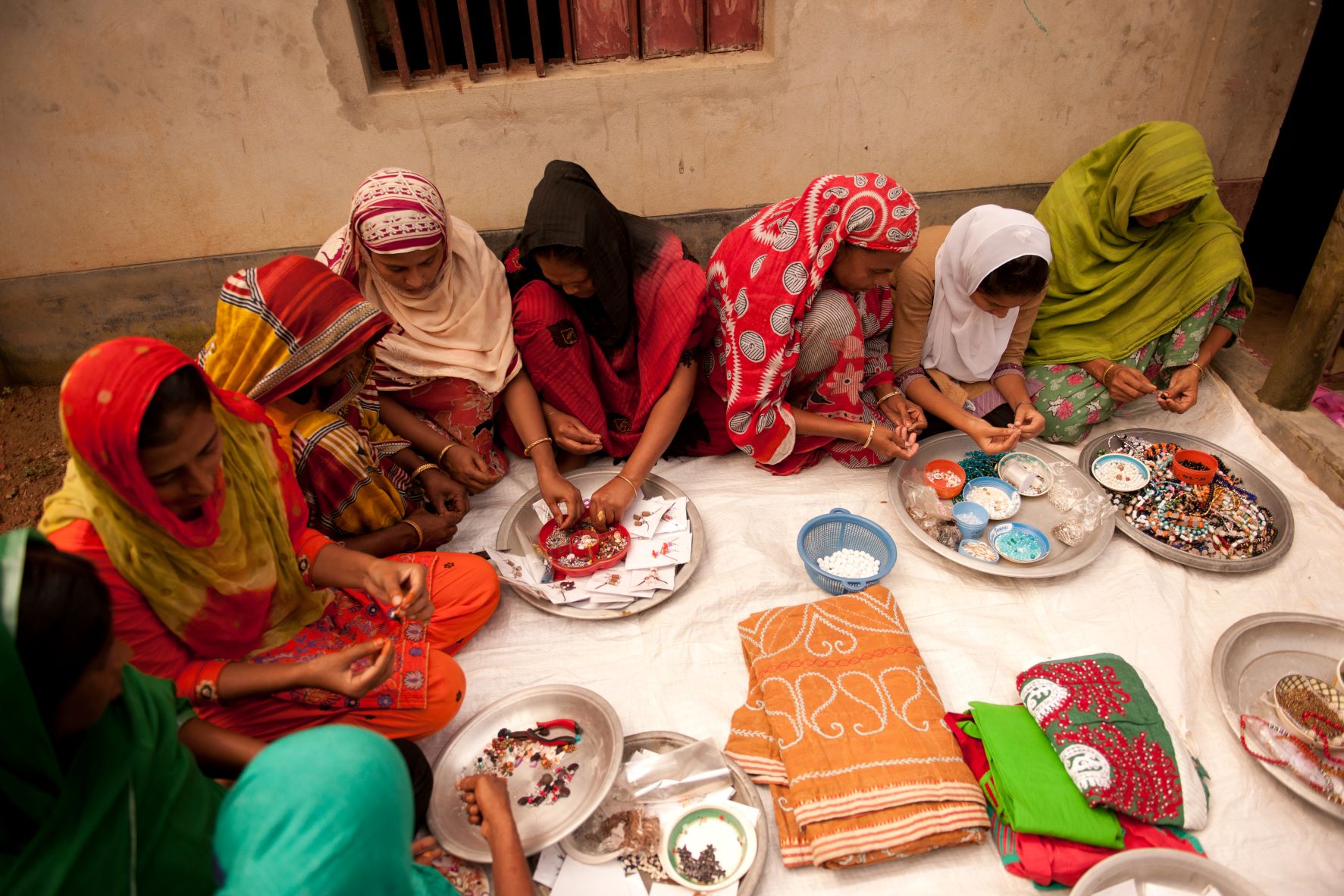
Ensuring human dignity and freedom by gradually reducing poverty in a sustainable manner, towards total elimination of poverty and beyond poverty in a sustainable development at the household level.
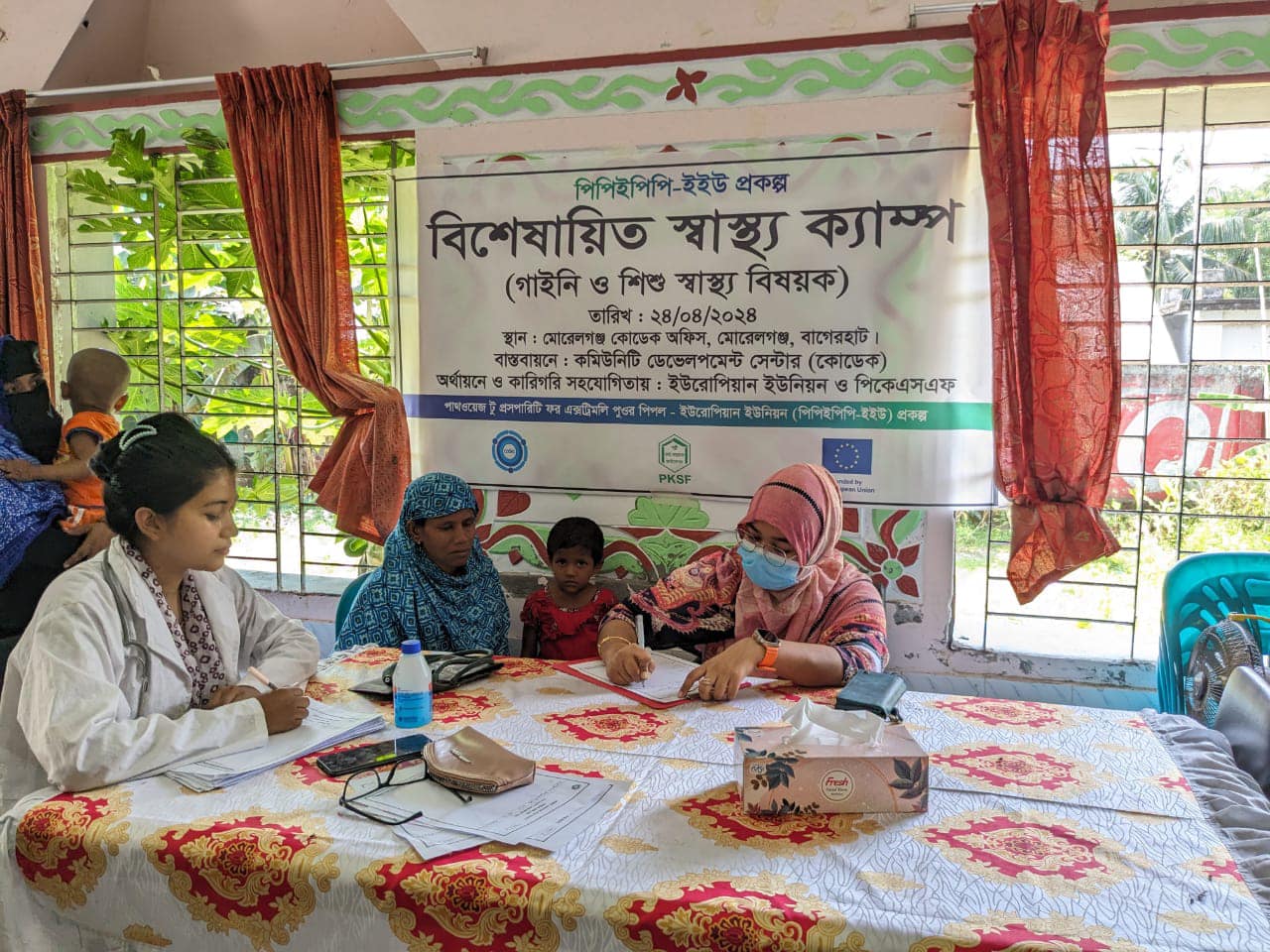
Project helps connect extremely poor people with mainstream economic growth and jobs for sustainable development
Pathways to Prosperity for Extremely Poor People – European Union (PPEPP-EU) Project
Pathways to Prosperity for Extremely Poor People – European Union (PPEPP-EU) is a second-generation poverty reduction project co-funded by PKSF and the European Union. The CODEC part of PPEPP-EU Project Target region characterized by a high prevalence of extreme poverty, focusing specially on Golachipa and Rangabali Upazilas in patuakhali district, as well as sharonkhla and Morrelganj upaziles in bagerhat district. under the project delivers a carefully sequenced package of multidimensional interventions, with a thrust on enterprise development and resilience building to help target households progress towards the mainstream socioeconomic growth trajectory. Technically, PPEPP-EU is a continuation of Pathways to Prosperity for Extremely Poor People (PPEPP) project which was jointly funded by the UK government’s FCDO and the EU. After the FCDO’s departure in March 2023, the EU has taken over the project to continue supporting some of the already organized target households, but under a slightly different name PPEPP-EU.
Sustainable Enterprise Project (SEP)
Launched in 2021, the Sustainable Enterprise Project (SEP) is a strategic initiative initially funded by the PKSF through the World Bank, targeting the districts of Bagerhat, Noakhali, and Patuakhali in Bangladesh’s coastal region. Presently the project is funded by CODEC CSR fund. With a primary focus on promoting environment-friendly construction materials and technologies, the project seeks to address critical environmental challenges while contributing to sustainable development in coastal areas.
The SEP aims to foster the adoption of eco-friendly construction practices and materials by engaging local communities, entertainers, construction stakeholders, and relevant authorities. Through targeted interventions and capacity-building initiatives, the project endeavors to raise awareness about the environmental impact of conventional construction methods and advocate for the adoption of sustainable alternatives.
Key activities under the SEP include the dissemination of information on environment-friendly construction materials and technologies, training programs for construction professionals and artisans on sustainable building practices, and the establishment of demonstration sites showcasing innovative construction techniques.
Furthermore, the SEP facilitates partnerships between local entrepreneurs, manufacturers, and suppliers to promote the product. By creating market demand for sustainable products, the project aims to stimulate economic growth while simultaneously reducing the ecological footprint of the construction sector.
In addition to promoting sustainable construction practices, the SEP also emphasizes the importance of incorporating climate resilience and disaster risk reduction measures into building designs. Through the integration of green infrastructure and resilient building techniques, the project aims to enhance the adaptive capacity of coastal communities to climate change impacts and natural disasters.
Overall, the Sustainable Enterprise Project (SEP) represents a concerted effort to promote environmentally responsible construction practices, foster economic development, and enhance resilience in Bangladesh’s coastal region. By harnessing the potential of sustainable enterprises, the project seeks to create a more sustainable and resilient future for coastal communities while contributing to broader environmental conservation goals.
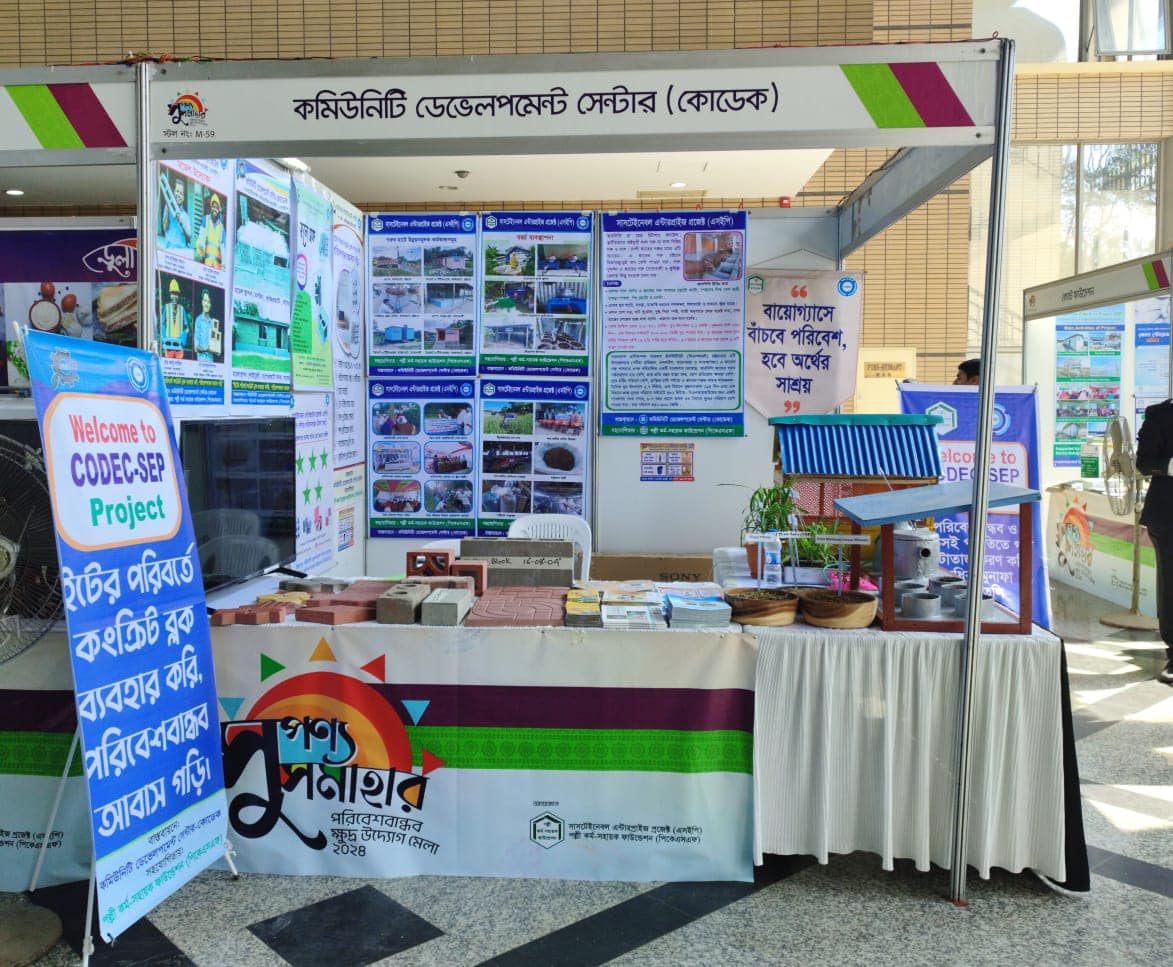
Promotion of Environment-Friendly Construction Materials and Technologies in the Coastal Region of Bangladesh
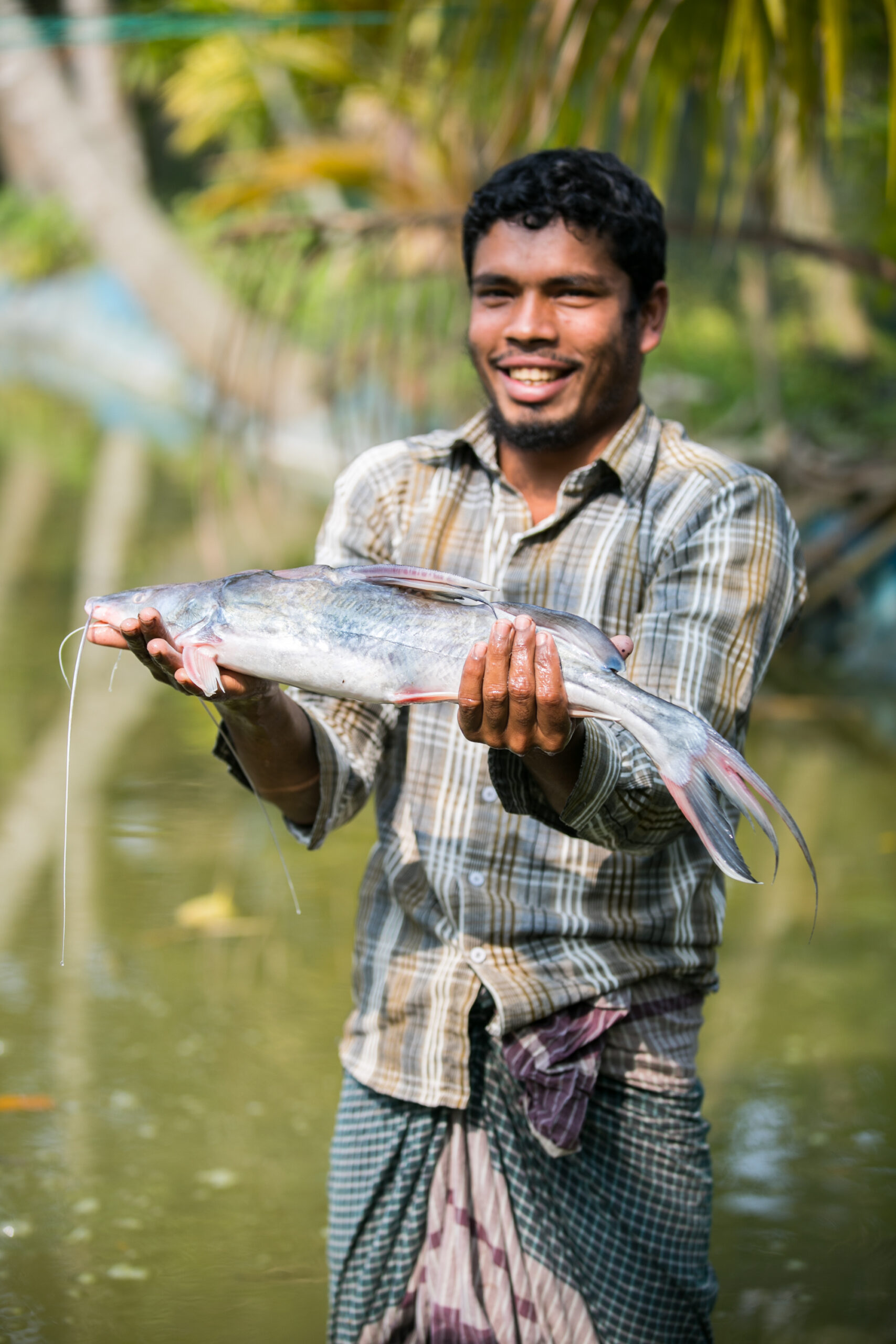
Increasing fish production to sustainable levels through good fisheries practices, ensuring safe food and improving market management of processed fish products
Rural Microenterprise Transformation Project (RMTP)
Commencing in 2022, CODEC implemented the RMTP project in the districts of Patuakhali and Barguna. With a primary focus on enhancing fish production to sustainable levels, the project aims to achieve this goal through the implementation of good fisheries practices, ensuring the safety of food products, and enhancing market management of processed fish products.
At the core of the RMTP project is the promotion of sustainable fishing practices that prioritize environmental conservation and resource management. By providing training and technical support to local fisherfolk, the project seeks to improve their knowledge and skills in responsible fishing techniques, including proper gear usage, selective harvesting, and adherence to fishing regulations. These efforts are aimed at safeguarding marine and terrestrial ecosystems while simultaneously sustainably increasing fish yields.
Moreover, the RMTP project places a strong emphasis on food safety and quality assurance measures throughout the fish value chain. By implementing stringent hygiene standards, quality control protocols, and certification systems, the project aims to ensure that processed fish products meet the highest standards of safety and are suitable for consumption both domestically and internationally. This focus on food safety not only enhances consumer confidence but also opens new market opportunities for local fisherfolk.
In addition to promoting sustainable fishing practices and ensuring food safety, the RMTP project works towards improving the market management of processed fish products. By strengthening market linkages, supporting value-added processing activities, and facilitating access to markets, the project aims to enhance the competitiveness and profitability of the local fishery sector. Through these interventions, the RMTP project seeks to empower fisherfolk and other stakeholders in the fish value chain to optimize their economic opportunities while contributing to the sustainable management of marine and terrestrial resources in the region.
The Project for Developing Inclusive Risk Mitigation Program for Sustainable Poverty Reduction (IRMP)
Launched in 2023, CODEC implemented the Integrated Risk Management Program (IRMP) in the Rangabali upazila of the Patuakhali district. This project, funded by the Palli Karma Sahayak Foundation (PKSF) through the Japan International Cooperation Agency (JICA), aims to enhance the resilience of poor households against financial risks associated with climate change.
The IRMP project adopts a comprehensive approach to address the financial vulnerabilities faced by communities in the target area. By integrating risk management strategies with livelihood enhancement initiatives, the project seeks to build the capacity of poor households to cope with and adapt to climate-related challenges.
One of the key components of the project is the provision of financial services tailored to the specific needs of vulnerable households. Through innovative financial instruments such as microinsurance, savings schemes, and emergency funds, the project aims to safeguard households against the economic shocks caused by climate-related disasters such as cyclones, floods, and droughts.
In addition to financial support, the IRMP project emphasizes capacity building and knowledge dissemination among community members. By conducting training workshops, awareness campaigns, and educational programs, the project equips households with the skills and information necessary to identify, assess, and mitigate climate risks effectively.
Furthermore, the project promotes the adoption of climate-resilient livelihood practices and technologies. By introducing sustainable agriculture techniques, alternative income-generating activities, and disaster-resistant housing solutions, the project aims to enhance the long-term resilience of households to climate-induced shocks and stresses.
Through its holistic approach to risk management and livelihood development, the IRMP project seeks to empower vulnerable households to withstand the impacts of climate change and build a more secure and sustainable future for themselves and their communities.
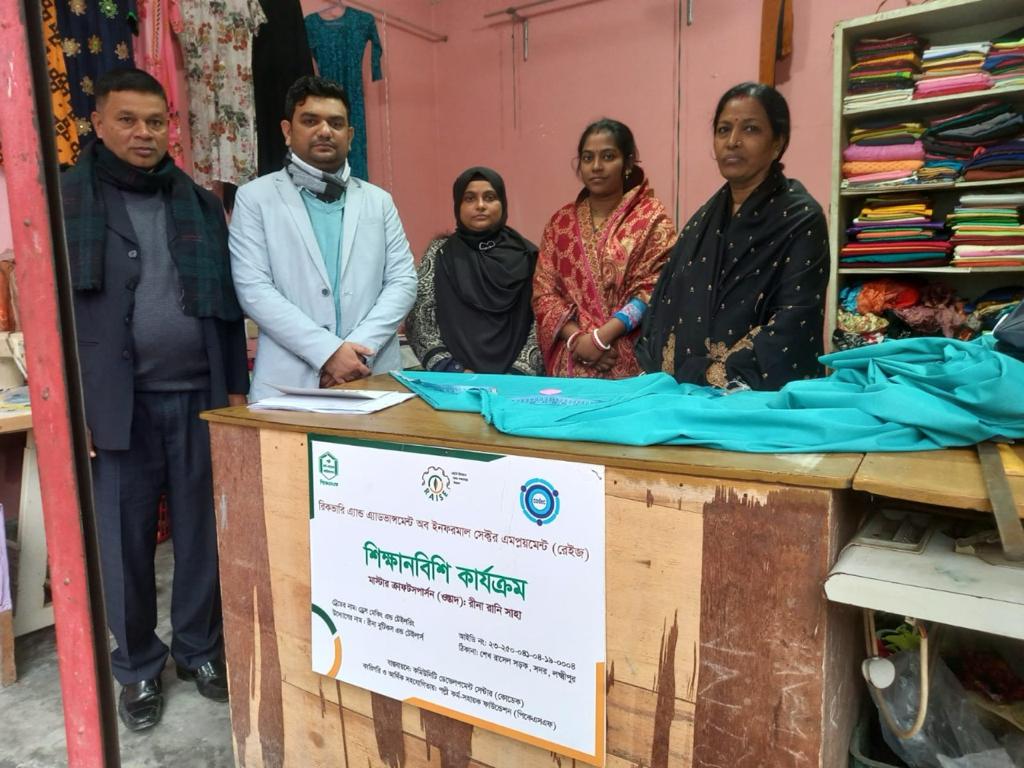
Enhance resilience against financial risks associated with climate change of poor households.
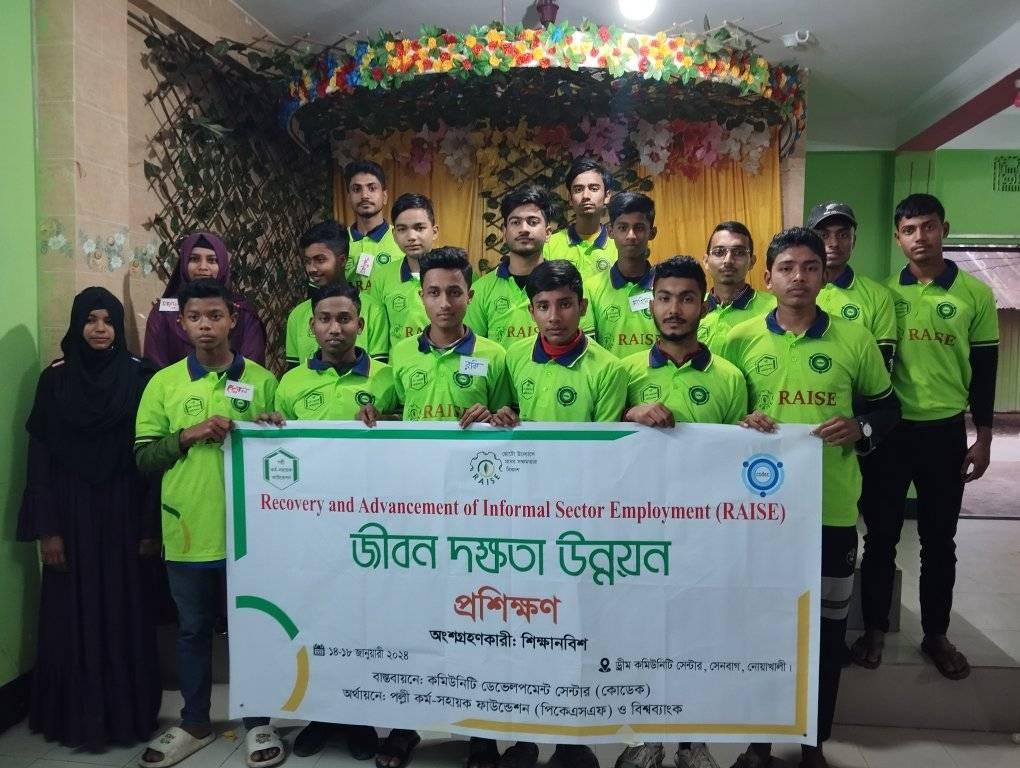
Reinvigorate the business activities of small entrepreneurs affected by COVID-19 and promote entrepreneurship through the enhancement of their capabilities.
Recovery and Advancement of Informal Sector Employment (RAISE) Project
Launched in 2022, the RAISE project is funded by the Palli Karma Sahayak Foundation (PKSF) through the World Bank. The project operates in the districts of Chattogram, Noakhali, Laxmipur, Chandpur, and Feni, aiming to support small entrepreneurs affected by the COVID-19 pandemic and promote entrepreneurship by enhancing their capabilities.
The primary objective of the RAISE project is to revitalize business activities among small enterprises adversely impacted by the COVID-19 crisis. Through targeted interventions and support mechanisms, the project seeks to address the economic challenges faced by small entrepreneurs, including disruptions to supply chains, decreased consumer demand, and financial constraints.
Key components of the project include providing financial assistance, technical training, and mentorship to small entrepreneurs. Financial support is offered in the form of grants, loans, or subsidies to help entrepreneurs recover from losses incurred during the pandemic and restart their businesses. Technical training programs focus on enhancing entrepreneurial skills, business management practices, and digital literacy, equipping entrepreneurs with the knowledge and tools needed to adapt to changing market dynamics.
Furthermore, the RAISE project emphasizes the promotion of entrepreneurship as a means of economic empowerment and sustainable livelihoods. By fostering a culture of entrepreneurship and innovation, the project aims to create opportunities for income generation, job creation, and economic growth within the target communities.
Through collaborative efforts with local stakeholders, including government agencies, financial institutions, and business support organizations, the RAISE project endeavors to build a supportive ecosystem for small enterprises. By strengthening the capacity and resilience of small entrepreneurs, the project contributes to economic recovery and resilience-building efforts in the aftermath of the COVID-19 pandemic, ultimately promoting inclusive and sustainable development in the project areas.
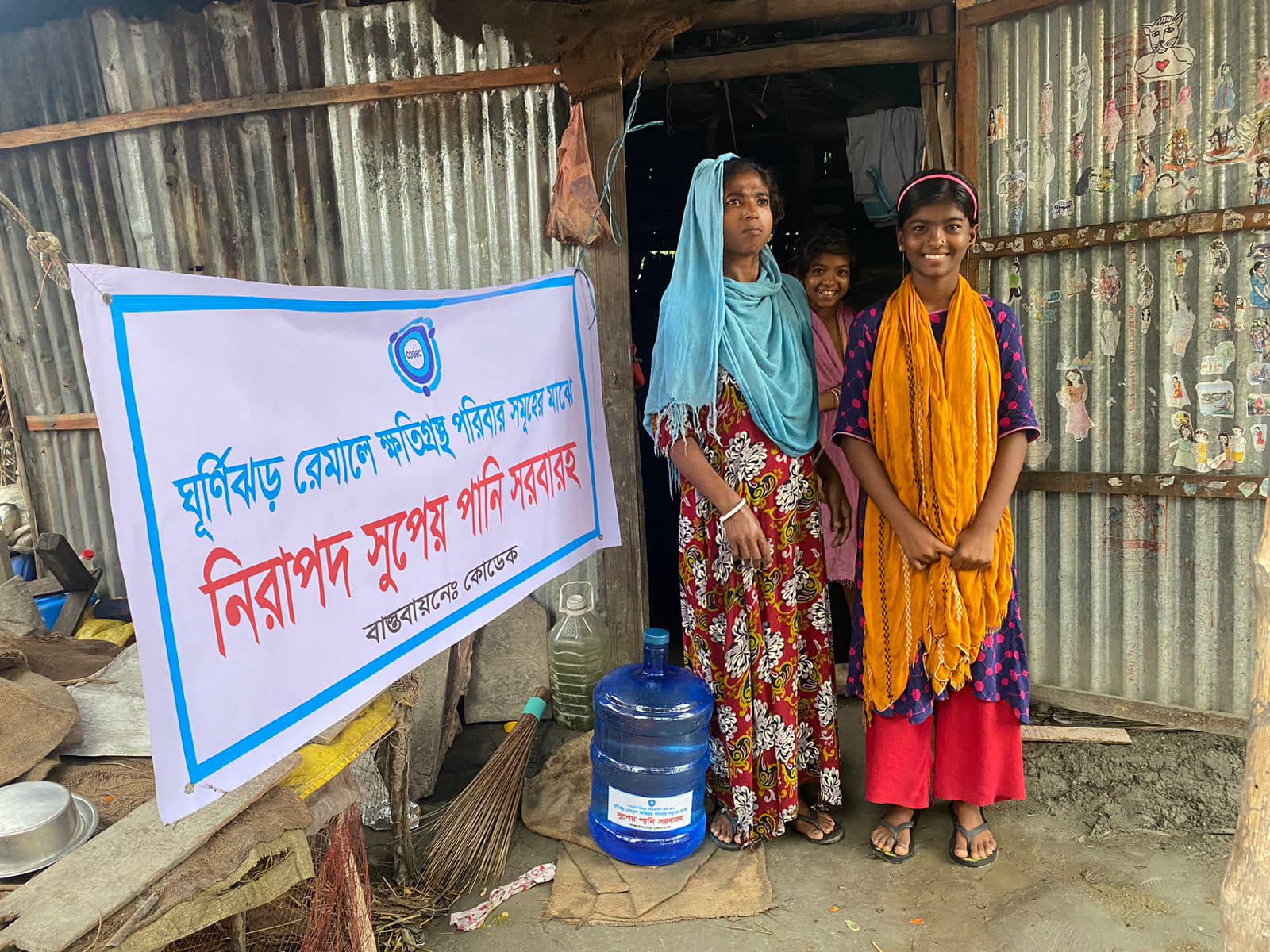
Improving access to safe water supply management and safe sanitation management in rural areas of Bangladesh.
CODEC WASH Project
Implemented since April 2022, the Water, Sanitation, and Hygiene (WASH) project operates across Chattogram, Feni, Bagerhat, Noakhali, Patuakhali, and Chandpur districts of Bangladesh. Funded by the CODEC Corporate Social Responsibility (CSR) fund, the project aims to enhance access to safe water supply management and promote safe sanitation practices in rural communities.
The project tackles critical challenges related to water and sanitation infrastructure in rural areas, prioritizing the establishment of sustainable solutions. Through strategic partnerships and community engagement, it mobilizes resources to implement contextually relevant interventions.
Key components include constructing and rehabilitating water supply infrastructure like tube wells and hand pumps. Hygiene education and behavior change initiatives empower communities to adopt and maintain hygienic practices.
The project also focuses on constructing sanitation facilities such as latrines and toilets, aiming to reduce open defecation and improve sanitation coverage. Gender-sensitive facilities promote dignity and privacy, particularly for women.
Through ongoing monitoring and evaluation, the project ensures effectiveness and adapts strategies as needed. By fostering sustainable water and sanitation management practices, it aims to improve health outcomes, environmental sustainability, and overall community well-being in rural Bangladesh.
Microenterprise Financing and Credit Enhancement (MFCE) Project
The Microenterprise Financing and Credit Enhancement (MFCE) Project, initiated in 2023, operates across 37 carefully selected microfinance branches of CODEC. The donor of the project is PKSF through the Asian Development Bank (ADB). With a clear vision, the project aims to support microentrepreneurs nationwide in establishing and sustaining environmentally sustainable and financially viable enterprises.
At its core, the MFCE Project is driven by the imperative to empower microentrepreneurs, recognizing their potential as agents of change within their communities. By providing targeted financial assistance and credit enhancement services, the project seeks to unlock opportunities for microentrepreneurs to realize their business aspirations while fostering environmental sustainability.
Through strategic collaboration with microfinance branches, the MFCE Project endeavors to bridge the gap between aspiring microentrepreneurs and essential financial resources. By offering tailored financing solutions and credit enhancement mechanisms, the project aims to alleviate financial barriers and facilitate access to capital for microenterprise development.
A key aspect of the MFCE Project is its commitment to promoting environmentally sustainable practices among microentrepreneurs. By integrating principles of sustainability into business development strategies, the project not only cultivates economic resilience but also contributes to environmental stewardship and resource conservation.
Moreover, the MFCE Project operates with a holistic approach, recognizing the interconnectedness of financial viability and environmental sustainability. Through capacity-building initiatives and ongoing support, microentrepreneurs are equipped with the knowledge and resources needed to navigate challenges, seize opportunities, and thrive in an ever-evolving economic landscape.
Ultimately, the MFCE Project catalyzes empowerment, enabling microentrepreneurs to realize their full potential while fostering a culture of sustainability and resilience within communities nationwide.
